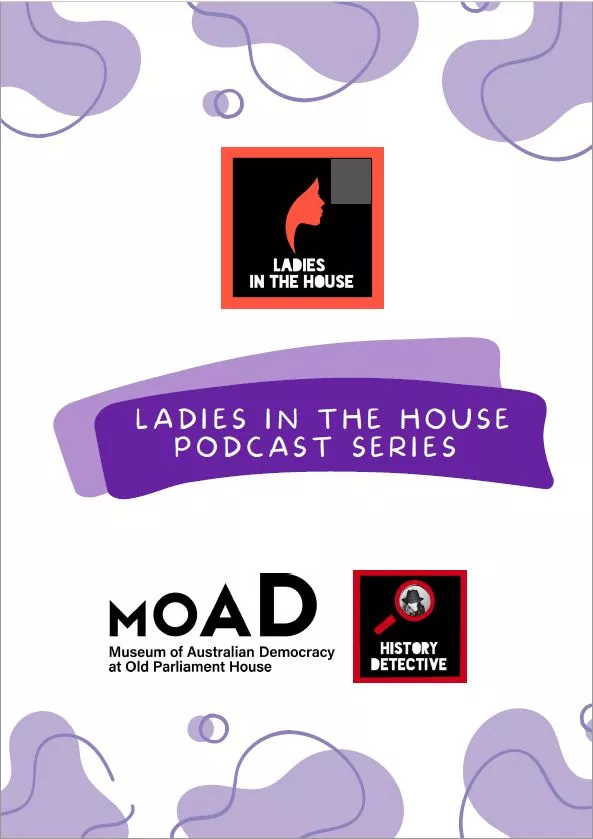Ladies in the House: Episode 6: Susan Ryan
Intro (music)
Hi, this is Kelly Chase and you are listening to Season 2 of a Museum of Australian Democracy and History Detective Collaboration: Ladies in the House. In this 3-part series we are going to celebrate the lives of three incredible women and how they contributed to Australian democracy.
In this episode I would like to introduce you to Susan Ryan.
1975 was the year that the two Australian territories, the Northern Territory and the Australian Capital Territory finally got representation in the Senate. And one of the first elected senators for the ACT was Susan Ryan, and she certainly made an impact! She helped to pass laws in Australia that protected women against workplace discrimination. But it wasn’t just discrimination against women that she fought for, she cared deeply about education. Later in her career, she also held the positions of both the age discrimination and the disability discrimination commissioner.
But first let’s pop in our time machine and see what life was like for women in the 1960s and 70s. You see, women’s jobs were not very secure, if a woman were to get married, she would get fired from her job. It was only in 1966 that a law was introduced that married women in the public service could keep their jobs. And, it was not until 1980 that married female Police Officers in the New South Wales Police Force were allowed to keep their jobs. Women would often keep their marriages a secret, just so they could keep their jobs.
Additionally, landlords would often refuse to rent homes to single mothers. Shockingly, it was not until 1983 that a woman could apply for a passport without needing her husband’s permission. And if a woman were to get pregnant, it was very likely that she would lose her job.
Let’s just say that there were not a lot of opportunities for women to be anything other than a wife and mother and there were insurmountable obstacles if she did try to have a career.
In the 1970s Susan Ryan began attending feminist meetings, but she wanted to do more than just talk about these inequalities. She wanted to make a change from the inside. She decided to go to the place where the laws are made. The Senate.
This is where the amazing work of the newly elected feminist Senator Susan Ryan came in. She was a member of the Australian Labor Party. Ryan believed strongly in equality for women, in her own words, “I felt from the youngest possible age that it was unfair, intolerable really, that females were regarded as second-class citizens.”
Susan Ryan played an instrumental role in introducing in laws that made discrimination based on gender illegal. The first of these was called the Sex Discrimination Act of 1984. The Act had three main points. Firstly, it made it unlawful to discriminate against you because of your gender, marital status, pregnancy or your potential to become pregnant. Secondly, the Act made it illegal to dismiss you from your job because of your family responsibilities. And finally, it made sexual harassment against the law. Susan Ryan regarded this achievement as, “Probably the most useful thing I’ve done in my life.”
However, bringing in this law was not easy. It took over a year from when she first introduced the bill to when it finally went through, and in the year leading up to the Act passing, the opposition party petitioned against the bill almost every day that parliament sat. One of these petitions said that the Act would undermine the traditional family structure of our nation. But Susan Ryan continued to fight, and in August 1984 the Act was eventually passed.
Another enormous achievement that she had was in her role as the Minister for Education and Youth Affairs, becoming the first female federal Labor Cabinet Member. She believed firmly that education was a tool for social justice. When she began the job as Education Minister in 1983 only 3 in 10 students graduated high school, and she made it her mission to change those statistics. Of course, the majority of those students dropping out of school were young women. By the time that the Labor Party left office, 8 out of 10 students were staying in school until Year 12.
Call to action (music)
Susan Ryan witnessed the restrictions that women had faced in society and decided to become a part of the political system that made the laws, so she could help to rewrite these laws to make a fairer and more just world for women. What I want you to think about today is, next time you are complaining about an unjust issue, stop and think about what genuine action you can take to help to try and change that issue?
This is Kelly Chase, on the case.
Before I go, if you are a teacher and would like a free lesson plan for this episode or any of the Ladies in the House season one and two episodes, you can head to the Classroom Resources page on the Museum of Australian Democracy website to download the lesson plan. Lessons include pre-listening vocabulary, reflection questions, a call to action activity and the transcript. You’ll find a link to the page in the show notes.
See you next time!







